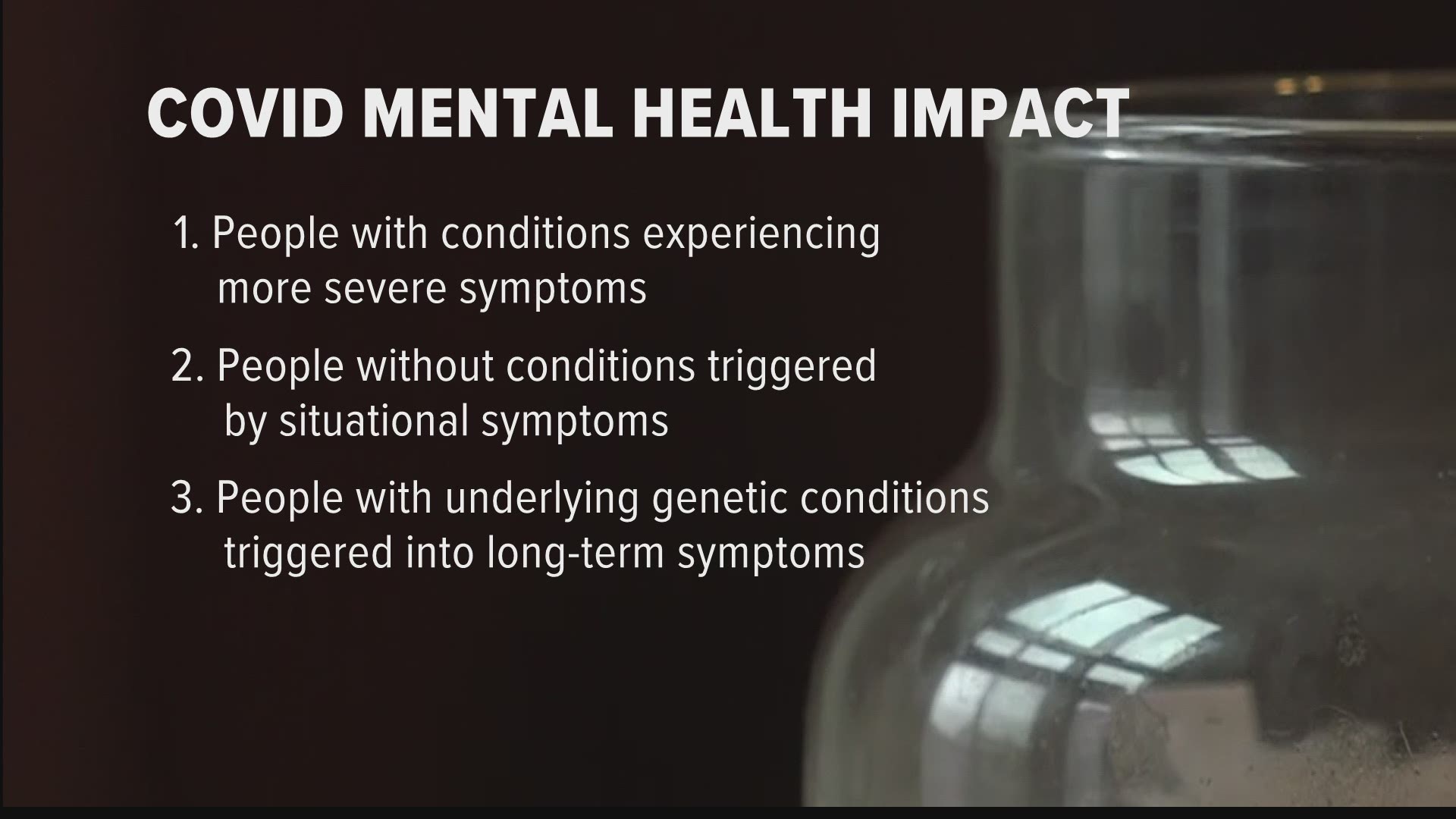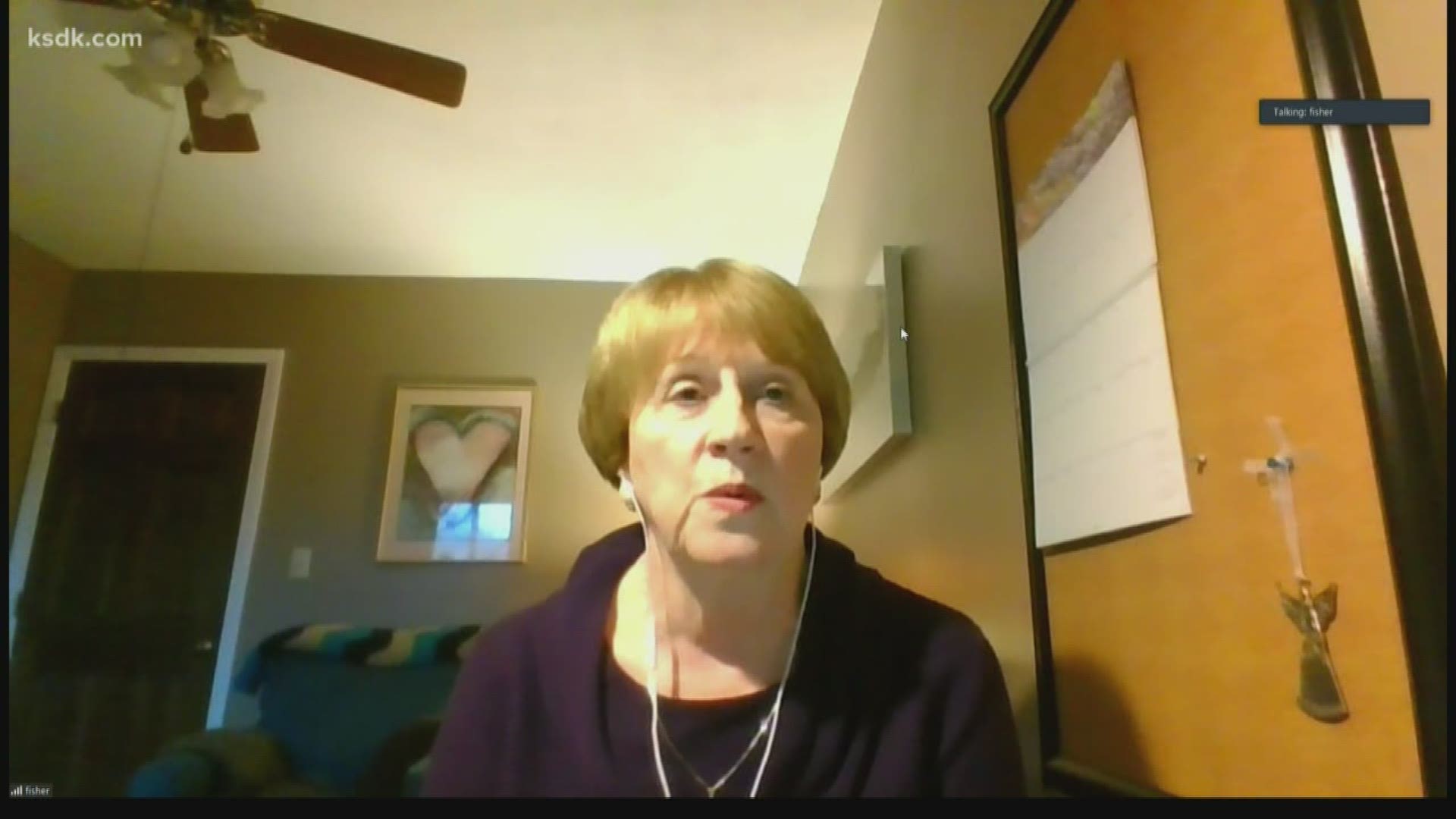ST. LOUIS — People all over the country are feeling the effects of the coronavirus pandemic in more ways than a cough or fever. We’re staying home, canceling plans, and unable to see loved ones in person. It comes as no surprise, then, that many Missourians say they’re feeling lonely or hopeless.
The NORC at the University of Chicago began the COVID Impact Survey in April to find out how people are dealing with the pandemic. Since then, over two weeks, the survey has asked people across the country how they’re feeling, what their lives look like and what they’re doing to prevent the spread of COVID-19.
The results for Missouri aren’t much of a surprise. Missourians say they’re feeling anxious, worrying about being able to afford food and missing out on the activities they enjoy. According to Dr. Bart Andrews, chief clinical officer at Behavioral Health Response in St. Louis, some people have handled it more easily than others.
“Many people who prefer more isolation have reported enjoying aspects of the lockdown and dread a return to normal, those that prefer more social contact are struggling more. It is not a one size fits all,” Andrews wrote in an email interview.
How are you, really?
The NORC survey asked how often people felt anxious, depressed, lonely, or hopeless in the last week. More than a third of Missourians said yes in each category. Around one in every twelve respondents said they felt that way for five to seven days of the previous week.
Andrews said persistent feelings like this can be helped by talking to a professional.
“For some folks, these symptoms might resolve by themselves but it never hurts to talk to someone and get ahead of the problem,” he wrote.
Conveniently, telehealth services are available, and may even be easier to reach than before the pandemic.
“There has been a decrease in people seeking assistance and so many agencies have capacity right now so in some ways it is easier to get connected for care, especially if those services can be provided by telehealth or telephone,” wrote Andrews.
BHR operates a 24/7 support line at 314-469-6644. Andrews says it’s available even for people who just feel like they need to talk to someone.
But it is harder to get the kind of care that is usually delivered face-to-face, he adds. In-person services have been canceled and some people have put off treatment because they are worried about exposing themselves to the coronavirus.
“On the whole, due to a combination of factors, it has been harder for individuals to maintain or get new services during the pandemic and I expect we will see a flood of folks reaching out as fear and restrictions decrease,” wrote Andrews.
Some Missourians are experiencing panic attacks, possibly for the first time. Across two weeks of surveys, nearly 10% of responses from Missourians said they felt symptoms like nausea, pounding heartbeat, sweating, and trouble breathing in the previous seven days.
“About 13% of the population will have a panic attack at some point in their life, so this is not an uncommon experience in the general public,” wrote Andrews. “It sounds trite but rule No. 1 of panic attacks is don’t panic about having them. Fear of having a panic attack increases likelihood that someone will have a panic attack.”
He recommends reading educational resources like the one at HelpGuide to learn about panic attacks and reaching out to a healthcare professional if the attacks are frequent enough to interfere with your life.
What we’re missing during COVID
Around a third of Missourians told the NORC survey they’ve had to adapt to restrictions that closed places they frequented, from churches to bars and gyms. Missourians who used to talk to their neighbors basically every day reported that they haven’t talked to their neighbors as often since March, and more than half of people who regularly volunteer in their communities haven’t done so in the last month. More than two-thirds of respondents said they had to cancel plans because of travel restrictions.
“People need to rejuvenate, unwind, see and do things outside of work and home and as a general rule, most humans do not do well with confinement, whether it is voluntary or not,” wrote Andrews. “In America, sadly, we think of relaxation and leisure as extras or luxuries but, in fact, these activities are basic human needs and deprivation has a major impact.”
Some people have gotten creative by developing new hobbies or creative outlets. Maybe you’ve found the time to perfect your sourdough bread technique or learn a dance routine in your living room. But the real creativity has come in the ways that people have stayed connected when they can’t see each other in person. More Missourians are talking to friends and loved ones with remote technology today than a couple months ago, according to the survey.
“I think the bigger challenge is that we take for granted how much incidental social contact we have, it just happens, talk at the water cooler, stopping by a colleague’s office, conversations at the mall, etc. Masks and social distancing mean we have to be more planful and persistent in arranging these social interactions, that takes energy and we are not used to it,” Andrews wrote.
What comes after stay-at-home
Things won’t necessarily feel like they’re back to normal even after all of the restrictions are lifted. For one, unemployment rates are at a record high and won’t return to their pre-pandemic levels immediately. More than 10% of Missourians who took the survey said they were recently furloughed or laid off, and a few additional respondents said they left work to care for a loved one or recover from an illness.
“There is strong evidence that prolonged unemployment, financial insecurity and unstable housing are incredibly damaging to our health and well-being,” wrote Andrews. These factors can lead to rising rates of suicide, substance dependence, and mental illness, he adds. “This will be especially problematic and costly as many folks are losing their insurance as well.”
Around a quarter of Missourians who took the survey said they worried that they would run out of food before they could afford to buy more. About 20% who responded said that they did run out in the last 30 days.
Uncertainty about the future is a significant source of the anxiety people are feeling now.
“Part of managing this crisis is first acknowledging that the world is an uncertain place and that being too focused on being safe makes us not only not safer but more anxious,” wrote Andrews. “The next step is to take action and build in routines and structures to the extent that you can. The good news is that humans are amazingly resilient and although we don’t like change, most of us adjust to it and can thrive in even the most precarious and uncertain situations.”
We also can't plan how we’ll feel when things start to look more familiar. Even if life looks like it did before the pandemic, it’s not uncommon to feel different.
“We often see an increase in emotional distress not during the crisis but after some semblance of safety arises. It’s often only when the danger has passed that the emotional impact hits,” Andrews wrote. “So, some folks who have weathered this well will continue to weather it well, it’s just who they are and how they are wired, but some folks who have weathered it well are likely to experience an emotional response as things return to ‘normal.’”
Some things you can do right now
Have you seen the memes about how much great authors and composers accomplished during quarantines in bygone eras? Or the social media posts from friends who have done amazing, productive, creative things while confined to their homes? Those can nudge your sense of happiness in ways that might surprise you. It’s a factor called “upward comparison,” Andrews said. Comparing ourselves to others is natural, but who you compare yourself to might be something you can control.
You might also be comparing yourself to people who are doing things that contradict current advice from health officials. Seeing someone in close proximity to others in public or not wearing a mask might make you feel angry, or it might make you feel like you should be doing the same.
“Some people are struggling so much that they are unable to maintain the guidelines, this can be emotional or financial or both. We all have different coping abilities and strategies and are responding differently to this situation. Making a choice to understand why others are making different choices based on their needs, rather than making negative attributions about their choices will improve your own sense of well-being,” recommended Andrews. “Harboring resentment and anger towards others rarely impacts them but always impacts us. Take a path of understanding while also reinforcing your own choices you have made for very valid reasons.”
Andrews recommends finding groups that share your values, interests, and perspectives, and avoiding messages that make you feel less valued or left out. Take some time to list what you have, enjoy, and are grateful for. Think about the meaningful things you are doing now.
“Finally, and I cannot stress this enough, just surviving this crazy world and getting through another day is worth celebrating,” wrote Andrews.
More mental health tips:
RELATED: Free mental health help is available


